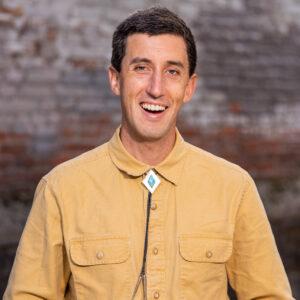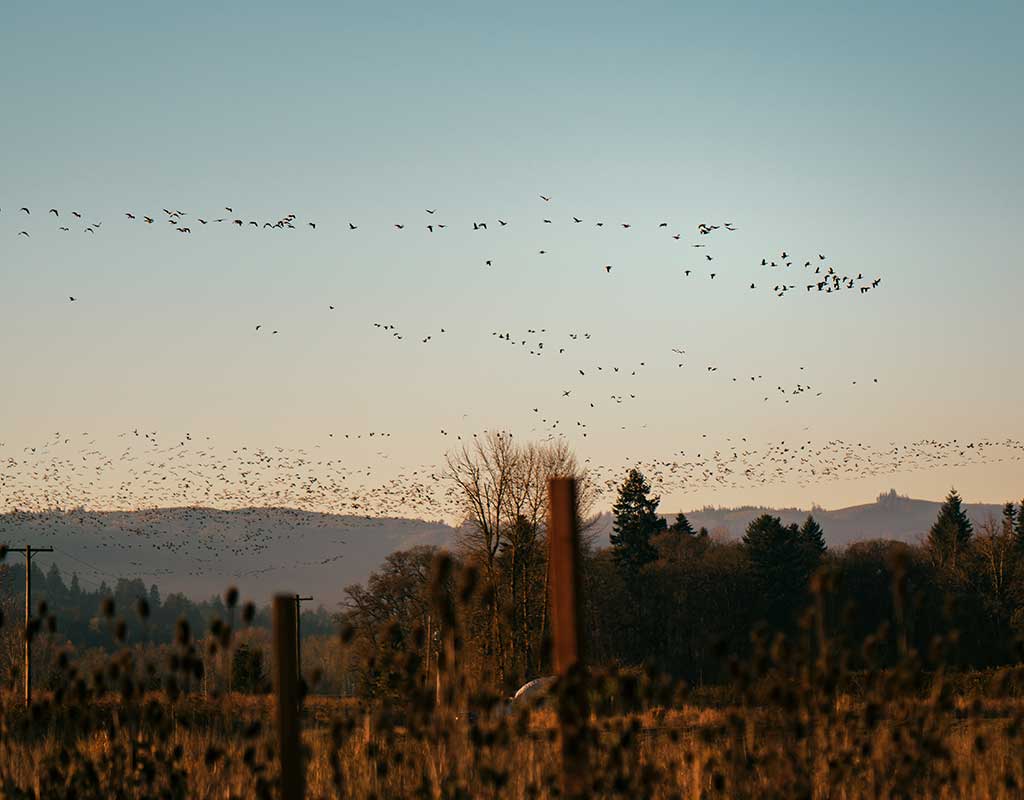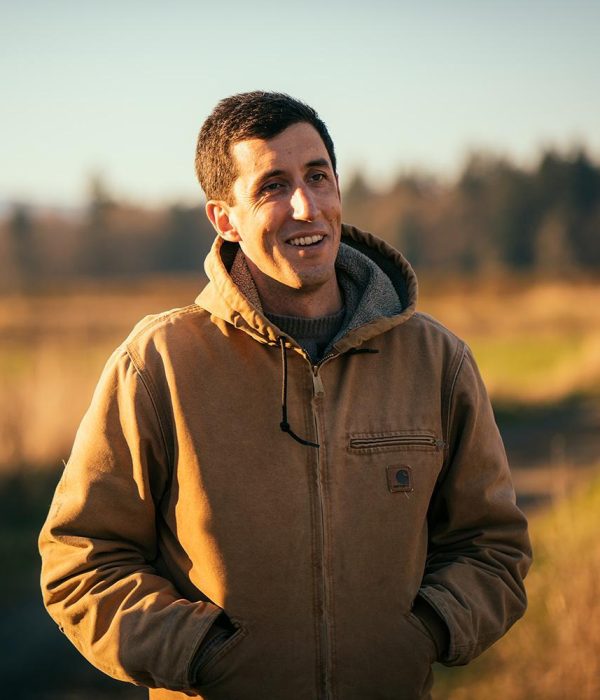
Program Director of Food Systems Equity
Aaron Vargas at Wapato Island Farm. Photo by Sean Gutierrez
Aaron Vargas, Food Equity Manager, reflects on how his identity, food, and community inspire his work building equitable, regional food systems here in the Pacific Northwest.
This past fall, during the change of season with the sounds of geese migrating overhead, I found myself at Wapato Island Farms, listening to farmer and folk herbalist Jennifer Rose Marie Serna share about her connections to the land, to community, and to healing ancestral ties to plants as medicine and food.
“To work hard is such an honor,” she said. “And that is the medicine…I feel so honored to have the ancestors that I do, because they really created me to work and to listen.”
That connection between ancestry and entrepreneurship is what I draw on to sustain and inspire my work at Ecotrust.

Migrating geese fly over Wapato Island Farm in Portland, Ore. Photo by Sean Gutierrez
After my bisabuela Mama Rosario immigrated from a pueblo in Jalisco, Mexico, she opened the Mexico City Grill in San Francisco, Calif. Three generations of my family were nourished by the restaurant; it was both our livelihood and a place of healing. My mother still shares fond childhood memories of walking through the back of the restaurant to the smell of quesadillas, sitting at a booth reserved just for family, where delicious, familiar food, storytelling, and rest were there, waiting.
“
Reclaiming my relationship to food is what centers my identity.
While food was and still is central to how my family connects and sustains our relationships with one another, like other U.S.-born Latinx folx, I experience a painful disconnect between sustenance and survival while navigating spaces where white-dominant culture prevails.
I identify as biracial, a Chicano who was raised in Half Moon Bay, Calif., on the ancestral lands and waters of the Ramaytush Ohlone peoples. And today, I feel more connected to my story and my ancestors than at any other time in my life—thanks in large part to the community of Black, Indigenous, and people of color (BIPOC) colleagues I’ve found at Ecotrust and the work we do together: co-creating equitable solutions for growing, harvesting, processing, distributing, and accessing food, built on a foundation of trust and shared learning. Reclaiming my relationship to food is what centers my identity.
The sense of solidarity with Ecotrust colleagues and partners stands in stark contrast to the culture surrounding industrialized food production that is underpinned by a legacy of land theft, systemic racism, and the exploitation of skilled labor. As a Chicano who closely identifies with exploited communities, my proximity to that legacy directly influences how I experience the impacts of this extractive, harmful model.
Before I found my way to Ecotrust, I worked on small farms outside Half Moon Bay and managed a farmers’ market in Springfield, Ore. In the field and at the market, I started questioning equitable access to nutritious foods, community ownership, self-determination, and my own privilege in this work. In both cases, I felt the most fulfilled when I was building relationships with BIPOC leaders who are best positioned to design effective solutions that center the unique needs and assets of our communities.

Aaron Vargas. Photo by Sean Gutierrez
Now, based in Portland as part of Ecotrust, I’ve had the privilege to be part of an organization working to elevate the lived experiences and leadership of BIPOC staff and our partners in the community—people like Jenny, who are not only farming as a means of making money, but who also see healing the connections between land and community as critical to resilience.
Right now, we are applying a loving critique to our work to-date and centering equity with even more intention, making gains toward that vision of an equitable food system—one that moves from being extractive to regenerative, provides lasting solutions for addressing and mitigating harm, and values relationships as a means of healing.
“
I felt the most fulfilled when I was building relationships with BIPOC leaders who are best positioned to design effective solutions that center the unique needs and assets of our communities.
Supporting community ownership and self-determination is central to this work. At Ecotrust, this looks like engaging in land ownership and succession from the understanding that who owns, manages, and accesses land is at the heart of the climate crisis, and a major driver of both wealth and inequality; collaborating with BIPOC food system leaders to access the resources they need to develop, implement, and advocate for regenerative agriculture and climate justice initiatives; and, utilizing our expertise in business development and the infrastructure at the Redd on Salmon Street to enable market access for BIPOC food businesses interested in scaling to meet demand from schools and hospitals throughout the region.

Stephanie Gutierrez, Forests and Community Program Director, and Aaron Vargas examine seeds at Wapato Island Farm in Portland, Ore. Photo by Sean Gutierrez
While 2020 was an incredibly challenging year, I saw my colleagues lean into our commitment to building mutually supportive relationships with BIPOC farmers, food businesses, and food system leaders, and grounding these relationships in an equitable exchange of capacities, resources, and power. We’ve been physically distanced yet socially connected—making space for engaging in the uprisings for Black Lives and responding with empathy to partners across the region as the pandemic brought a host of uncertainties to our work together.
I am proud to be part of this sustained commitment, to be joined by fellow staff who are equally dedicated to the long-term vision required to bring about a just transition to the regional food system we seek.
I believe resilient relationships can help us build an equitable regional food system. Being invited into and participating in this work feels distinctly familiar to me: It’s very much like coming to the table together and sharing a meal.
